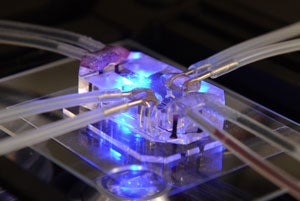
Harvard University’s Wyss Institute for Biologically Inspired Engineering has received a contract from the US Food and Drug Administration (FDA) for assessment of medical countermeasures for acute radiation syndrome (ARS) treatment.
Awarded through a broad agency announcement (BAA) for the advanced research and development of regulatory Science, in the area of supporting medical countermeasures development to protect national health and security, the $5.6m contract covers supply of Wyss Institute’s organs-on-chips technology.
Organs-on-chips are microchips designed to replicate the functions and interactions between the living tissues present in living organs, such as the lung, heart and intestine.
The chips will be used by Wyss Institute scientists to develop radiation damage models in lung, gut and bone marrow, for testing candidate medical countermeasures for ARS, with the aim to obtain valuable information for facilitating development.
FDA counterterrorism policy assistant commissioner Luciana Borio said the organs-on-chips technology transforms the products evaluation methods, which are critical to advancing regulatory science underpinning all FDA regulatory decisions.
See Also:
”It holds enormous promise for improving our understanding of new medical countermeasures, particularly when it is unethical or unfeasible to conduct efficacy studies in humans, and when available animal models have limited use in accurately predicting human response,” Borio said.
How well do you really know your competitors?
Access the most comprehensive Company Profiles on the market, powered by GlobalData. Save hours of research. Gain competitive edge.

Thank you!
Your download email will arrive shortly
Not ready to buy yet? Download a free sample
We are confident about the unique quality of our Company Profiles. However, we want you to make the most beneficial decision for your business, so we offer a free sample that you can download by submitting the below form
By GlobalDataAlso called radiation poisoning, radiation sickness or radiation toxicity, ARS is an illness affecting a combination of organs following exposure to ionisation radiation, resulting from a nuclear or radiological incident, over a short period of time.
Despite posing complex scientific challenges, development of medical countermeasures for ARS treatment remains a high-priority for the US government.
The involvement of several organ systems makes it difficult to study candidate medical countermeasures that target the radiation effects on one specific organ system in animal models.
In addition, certain candidate medical countermeasures cannot be effectively studied in animal models as their activity is specific to human beings, which are expected to be addressed by Wyss Institute’s organs-on-chips technology.
Image: Wyss Institute’s lung-on-a-chip replicates complex mechanical and biochemical behaviours of a human lung. Photo: copyright of Harvard College.








